Organizers for tools: choosing a model and making it yourself

Working with a large number of working tools poses a difficult task to place them so that it is convenient to transport and quickly find everything you need in the process of any repair. An organizer for tools helps to solve both problems, and you can either purchase it or make it yourself. For its correct selection or creation, you need to have certain knowledge about the models and options for data storage systems of the tool.


What?
In everyday life, we are surrounded by quite a few tools that must be kept in perfect order. Organizers, which can have a different appearance, location and material of manufacture, do the best with this task.
The main task of storage systems is to organize equipment according to some criteria. - it can be purpose, size, and so on. Tools can be stored in the home or in the garage. In the first case, you need organizers that can accommodate everything you need, while taking up a minimum of space, in the second, you need to rationally distribute all the equipment around the room so that it can be seen and conveniently used in any situation.
An organizer for tools can be:
- wooden;
- plastic;
- combined.



Their size depends on the content - the larger the instrument, the larger the storage space can be. The advantage of organizers is that they can be made with your own hands, selected for specific needs and conditions, which will make their use more convenient and rational.
Design and types
Due to the variety of tools, the design and types of organizers can be very diverse.
- Wall - is a vertical option for placing equipment, for which a wall or cabinet door is used. Most often it is equipped in workshops, where all tools must be visible for convenience and speed of use. This option can be one-sided when attached to the wall, but two-sided, which can be placed on the floor or table, will be more convenient and roomy. On the one hand, for example, there can be holes for drills, on the other, all screwdrivers can be placed.
- Textile organizer-roll - ideal for a small amount of inventory with small dimensions. The disadvantages of this option include the small durability of the fabric structure. To make the textile organizer more reliable, it must be closed, for which you can use an elastic band, Velcro or make a product with a zipper. You can build textile organizers that will be conveniently attached to a ladder for convenience and safety of work. For fastening to the equipment, it is worth using metal hooks or special carabiners, which will provide reliable fixation.
- Desktop organizer box with compartments for various tools - departments can be stationary or taken out, which makes it possible to equip the box with everything you need. The convenience of such an organizer in mobility, it is possible to place everything in one place and use it in different places, carrying out repair work.
- Large wardrobe on wheels with drawers - the most convenient option for a garage or workshop, where all work is carried out. Due to the massive design, it is possible to place inventory of different sizes in one place, and the presence of wheels will make it possible to move the cabinet to any place in the garage for the convenience of work.
- Garden Tool Wall Panels - they can be purchased and have a specific purpose or made from improvised material, but perform clearly assigned functions. Garden tools take up quite a lot of space, therefore systematizing it and determining its place for each item will make it possible to increase the free space in the room and put it in order.
- For storing small tools such as nails, screws, nuts and bolts, it is most convenient to use small plastic containers that are attached to a horizontal or vertical surface. You can purchase specialized drawers or use plastic food cans.
- Homemade organizer that fits over the bucket - the convenience of the option in its simplicity and practicality. A fabric frame with pockets of different sizes is made for the equipment. It is important that the size of this organizer is exactly the size of the bucket you will be putting on. Inside the bucket, it is possible to place larger and heavier tools, which are carried all together to any place in the room and outside.





Thanks to a wide range of tool organizers, you can choose the best option, taking into account the size of the equipment, the distance of its transportation and the frequency of use.
How to choose?
To choose the right type of organizer, you need to clearly understand why it is being selected, for what needs and tools. If at work you have to carry a tool with you all the time, then the best solution would be a case or suitcase that has the optimal dimensions, weight and a high-quality and comfortable handle. If the tools are at home all the time, then for them stationary structures can be created with the definition of a place for each item.
You need to buy or create an organizer taking into account what exactly will be in it. For a large number of small parts, a product with a large number of compartments is optimal, where all available little things can be evenly distributed. For large-sized devices, you can purchase or build a special container designed for specific equipment.

In order to be able to make small repairs at any time or help someone out by coming to the rescue, you need to have an organizer bag with you, where there will be a minimum set of tools that can be used in different life situations. This option is always worth having in the car and even in the workplace, its small size and good spaciousness will allow it to be positioned so that it does not interfere, but will help out if something happens.
When choosing an organizer, you should pay attention to the material. For frequently used designs, you should look for something durable and reliable: metal or high-quality wood, and for sets on the occasion, you can do with textile handbags. For stationary storage, plastic is the best option.


Review of the best models
Due to the expansion of the market for goods and services, the number of organizers for tools is growing rapidly, delighting buyers with new materials, forms and content. To choose a good product, you can evaluate its manufacturer and its best models.
- Plastic organizer Intertool 9 - a small but functional box in which you can carry and transport both small tools and small parts that will be needed for work. Thanks to compartments of various sizes, you can rationally distribute its contents. Thanks to the latches, it is possible to securely fix the drawer, preventing it from opening at the wrong moment.
- Plastic organizer box Intertool 17 - this is a suitcase made of high-quality plastic, with a spacious spacious compartment at the top and drawers for small items, which have a large number of compartments into which you can conveniently expand the equipment necessary for work. The box is fixed on reliable latches, which does not allow it to open during transportation.
- Keter Cantilever Organizer Plastic Container 18 - a capacious and not very large box with removable compartments, which provides increased comfort in work. Advantages: high quality, ease of use, reliable handle. The only drawback is the considerable cost of the equipment.
- Vertical organizer Stanley 1-93-981 - has a small size, but allows you to place all small items in one place. The abundance of compartments makes it possible to divide equipment by type, size and purpose. The box has grooves for installing dividers, but they are not included in the kit.
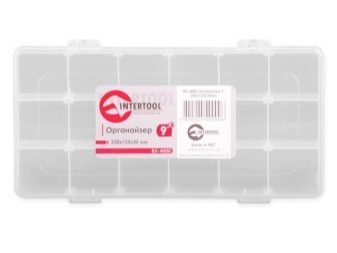



Among the most popular brands that produce organizers are:
- Biber;
- Fit;
- Gedore;
- Gigant;
- Neo;
- Stayer;
- Stels;
- "Topex";
- "Bison";
- "Buttress";
- "Well".
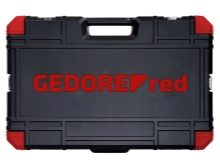


Each has certain features, advantages and disadvantages, having considered each option separately, the type of its material, design features and dimensions, a certain conclusion can be drawn. The price range, a certain focus of goods, configuration features, all this will make it possible to find the ideal organizer for specific needs.
Manufacturing materials
It is not difficult to buy an organizer for a tool, but it is difficult to find one that would satisfy all the requirements, therefore, real craftsmen often prefer to make them on their own. The most acceptable and convenient for this will be materials such as:
- wood (plywood);
- plastic;
- metal.


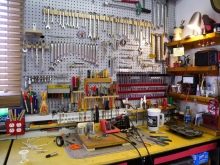
The wooden version is the easiest to make, since the material is easy to use, and you can build a product of any shape and size from it. Plastic options are less popular for creating something beautiful and reliable, but this material makes excellent partitions that divide the common space into certain zones, which makes it much easier to find the parts you need.
Metal homemade organizers rarely look attractive, but they are durable and will last quite a long time under any conditions. The choice of material can be dictated by the size and number of tools that will be placed in it; for minimal needs, it is easiest to do with a fabric option that can be sewn without much difficulty.


How to do it yourself?
A homemade tool organizer can be an alternative to a purchased one if it is used only at home. Before starting work, it is worth evaluating the number and variety of the tool that needs to be systematized or rationally decomposed, and decide which type of organizer should be chosen for a particular case:
- on the wall;
- small portable wooden box;
- stationary structure of medium to large size.
Getting down to business, the first thing you need to do is draw the drawings of the future project, calculate all the dimensions and check if everything you need will fit, or you need to make edits. If the measurements were made correctly, you can select the optimal material, transfer the markings to it and cut out the details.

The wall-mounted version should have fasteners on which it is placed in its place, as well as holes or hooks on which the inventory will be hung. A portable box can be made of plywood or wood, it should be light, but quite strong, and have several functional compartments.
A large organizer is often equipped with wheels for ease of use, and it contains many drawers.
Operating rules
In order for the tool organizer to serve for a long time, and it does not have to be repaired or made a new one, it is important to be able to handle it correctly:
- from time to time it is necessary to check the general condition of the structure;
- if the material needs periodic processing from wear and tear, it must be carried out on time;
- do not put more tools in the organizer than the amount for which it is designed;
- portable structures must be carefully placed on the floor or in the car to avoid any deformation;
- in the presence of locks and latches, it is important to open and close them slowly and carefully so as not to damage them.
With knowledge of these basic rules, you can use homemade or purchased organizers for a long time without any damage to their condition.

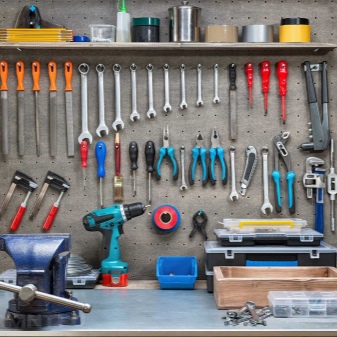
Interesting ideas
In addition to the basic options for organizers, which are used for systematic and convenient placement of equipment, there are more interesting and creative options.
A true master easily uses available means to place certain instruments. Metal keys, if there are not very many of them, can be hung on a magnetic strip, for small rounded parts, drill the same holes in a wooden shelf, and for inventory with handles, there is an option to place them on special hooks that are simply screwed into the wall.

If there are not too many tools at home, then it can be neatly placed on one wall, having built its own holders for each inventory. Using wooden and plastic elements, you can make supports in the form of protruding elements on which the tool is placed, drill holes for miniature equipment, make a simple shelf for various useful little things, and also supplement the organizer with hooks or self-tapping screws screwed into a wooden surface.
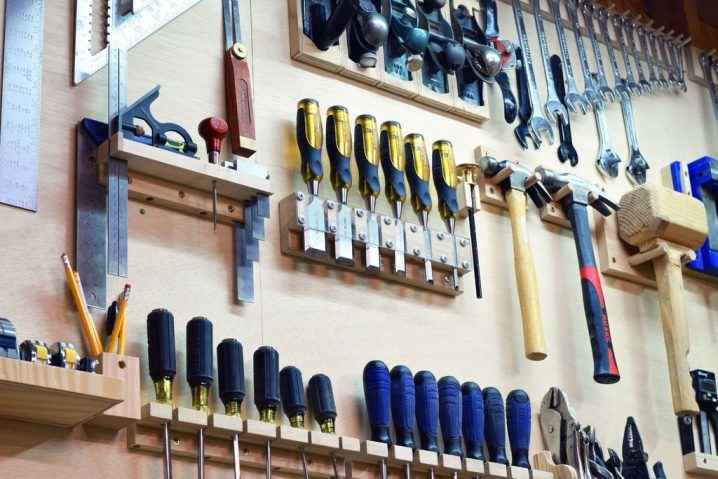
The most convenient will be a wall organizer that looks like a cabinet with opening doors. In the closed position, all the contents are not visible, and the room seems much cleaner and tidier, and thanks to the doors there is an additional work space that can be rationally used by placing a small tool on it.

For information on how to make an organizer for tools, see the next video.













The comment was sent successfully.